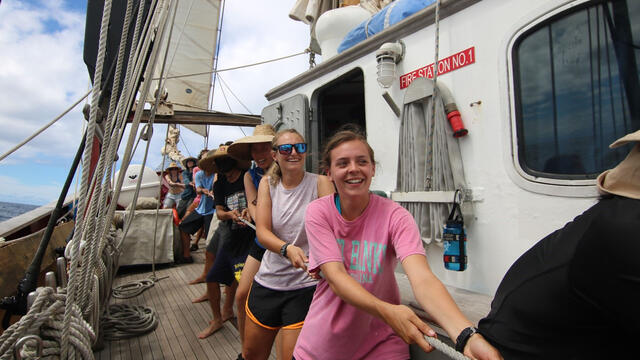Alumna discovers a mission in the planet’s most remote coral reefs
Just days after her graduation this May, Riley Palmer sailed from Tahiti to Hawaii on board SEA Semester’s ocean research vessel, the 134-foot brigantine SSV Robert C. Seamans. Along the 2,600 nautical mile route, the Biology major from Pikesville, Md., studied the effects of environmental change on remote and pristine Pacific coral reefs.

Just days after her graduation this May, Palmer sailed from Tahiti to Hawaii on board SEA Semester’s ocean research vessel, the 134-foot brigantine SSV Robert C. Seamans. Along the 2,600 nautical mile route, the Biology major from Pikesville, Md., studied the effects of environmental change on remote and pristine Pacific coral reefs.
Hundreds of miles from land under a night sky littered with more stars than she had ever imagined possible, Riley Palmer ’18 traded sleep for precious moments on deck with her shipmates, picking out constellations and navigating life.
Just days after her graduation this May, Palmer sailed from Tahiti to Hawaii on board SEA Semester’s ocean research vessel, the 134-foot brigantine SSV Robert C. Seamans. Along the 2,600 nautical mile route, the Biology major from Pikesville, Md., studied the effects of environmental change on remote and pristine Pacific coral reefs.
Snorkeling among millennia-old coral, past black-tip sharks and other reef dwellers, to explore some of the most distant reefs on the planet will always stand among Palmer’s most incredible and inspirational experiences. There, in the middle of the vast Pacific Ocean where plastic pollution punctuates nature’s most sensational wonders, her passion for marine conservation deepened and took root as a possible career.
“Getting the opportunity to interact with and observe nature in that close of quarters is an experience that I had not really had before and the beauty of those reefs will stay with me and continue to inspire me to conserve our planet,” she says. They stopped at islands — Moorea, Rangiroa, Karoraina and Kiritimati — to survey reefs for the health and diversity of wildlife and conducted both group and individual research on board the ship.
With the students from Harvard, Penn State, American, UConn, Hawaii, Michigan and other universities who would be her shipmates, Palmer took a month-long online course to prepare for the research voyage. Onboard, she learned to sail — quickly picking up both terms and uses of the lines on the ship, the names of the sails, how to handle the sails and how to navigate using modern and celestial techniques.
“I learned how to use a sextant and how to shoot the stars,” says Palmer, adding that she used more math navigating than she would have guessed during the four-and-a-half-week sail. “I can now determine our latitude and longitude using celestial bodies — the sun, moon and stars.”
Still, top billing on Palmer’s list of favorite things are the friends she made from colleges across the country and that sky — that pitch-black night sky speckled with stars.
“The ability to view the night sky in that isolated of a location was awe-inspiring too,” she says. “Getting off watch and just sitting up on deck, star gazing and learning the constellations all while talking to my ship mates is what I miss most about the trip.”
Palmer’s research skills, fine-tuned during independent research experiences in McDaniel labs, enabled her to manage and complete her own study of mixotrophic zoo plankton, organisms that behave as both plants and animals. Since these mixotrophic organisms take carbon from the atmosphere, they may play an important role in conservation.
“Because of my independent research at McDaniel, I was able to conduct a well-organized, thoughtful project, and I completed it days before the deadline, so I was able to proofread my work and I was able to add a second mini-experiment to my project,” she says, explaining that she collected the zooplankton using giant fine nets that the tiny organisms couldn’t slip through.
A cultural exchange with a high school on Kiritimati (Christmas) Island, a coral atoll in Kiribati, was particularly eye-opening. There were no bathrooms and the school had no chairs, desks or chalkboards. The visitors were told to simply throw their trash on the ground.
“It made me realize how fortunate we are to have the infrastructure to be able to afford what we deem as basic necessities and it also made me realize the difficulties local communities face in terms of environmental conservation,” Palmer says. “The experience showed me how privileged we are as a society and gave me more insight and understanding in the difficulties facing conservation efforts.”
Riley Palmer '18, in a pink shirt, helps raise the main sail on board the SEA Semester ocean research vessel, Robert C. Seamans.